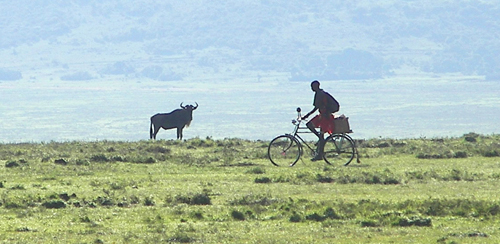
Last May I blogged about this sad story in partial error, resulting in my concession that the blog had enough misleading information to be adjusted. The incomplete discussion of the problem remains a serious part of this story.
The controversy remains: the Tanzania government wants to evict 40,000 Maasai from traditional lands to increase a hunting concession for Dubai businessmen and princes.
The error so many of us participated in last May was reporting the controversy as an immediate crisis.
And that escalation of reportage has worsened. Respectable media reported today that the evictions have already begun. They haven’t.
We were led to our mistakes last May by the organizers of a very successful petition campaign on behalf of the Maasai, which has exceeded its wildest expectations by the way.
In May the organizers of the petition broadcast an urgent appeal for signatures based on an exaggerated claim that the government was imminently prepared to forcibly oust the Maasai.
Several of my readers pointed out to me this wasn’t true. The problem was real – and continues – but the immediacy was overstated and the government had set no deadline for forced eviction.
The situation is the same today.
Numerous legal maneuvers have been going on in Tanzania for some time, long before the petition campaign began. These continue today.
This past weekend, a report in London’s Guardian attributed to another report from Survival International elicited comments from the organizer of the petition which were exaggerated and went viral.
The story even emerged as a headliner in America’s normally very careful electronic media, Salon.
This is a complicated and serious story, and the media (including at first, me) just doesn’t seem to know how to handle it correctly.
Survival International, in fact, has a good time line of the real story. Click here.
The government’s policy came to the fore five years ago. There have been ups and downs, and based on today’s useless meeting in Dodoma, I’d say the government is losing the battle of waiting it out, and that’s good.
And it’s so good that many of my readers and others worldwide have signed the petition. But like a previously exaggerated social meeting campaign, Save the Serengeti, the movement starts to become more important than the issue.
Save the Serengeti absolutely contributed to stopping the building of the Serengeti highway (when it was in its first iteration, Stop the Serengeti Highway) but in no way alone despite its self-promoted appearances. Moreover, when building the highway was stopped, the campaign didn’t.
The real development of this Maasai story is simpler. Under increasing pressure to abandon once and for all the government’s policy to evict the Maasai from Loliondo, the government has offered a cash payment in compensation to 40,000 Maasai.
The offer is for approximately two-thirds of a million dollars or about $15 per person evicted, in addition to previous offers of new land that theoretically equals or exceeds the land that would be confiscated.
Today’s meeting in Dodoma was to discuss this new offer, and as expected, Maasai leaders rejected it.
Undoubtedly this new emergence of the controversy benefits the Maasai, and that’s good, too. It’s just not … well, exactly right to think of it as immediate to this prolonged problem.
Meetings occur all the time between government officials and Loliondo Maasai. Ridiculous moves like $15 per Maasai evicted should hardly be considered starting new or more serious confrontations.
Yet even in Arusha some thought so. Last night an arsonist started a terrible fire in Arusha that caused some to wonder if it was in protest of the Dodoma meeting about the Maasai eviction.
I received several requests to write this blog. I’m extremely thankful for my readers’ sensitivities to this problem. I’m glad that we’re all “on the side” of those benefiting from the exaggeration of the problem.
But ultimately it’s the facts that matter. It’s the facts we need to be vigilant about, not the hysteria.
Is the real issue here not that the Masai before the Serengeti was declared and they were moved out in the late 1950’s had space enough for their herds to graze – there was enough space for the herd sizes to grow and then with a drought or equivalent for the cattle numbers to be reduced again naturally. The issue here is a global issue “we are running out of space” – and this is not just a Masai problem – the western world certainly has increased in number far more drastically than the Masai and our “cattle” has destroyed more land than any other segment of society on earth (well except perhaps China and India would have had a faster population growth rate). The numbers do not matter – the principle is that the Masai need more land because they are accumulating more wealth (cattle) and in their eyes they have been put out of their original grazing land already (the Serengeti) and now there is a foreigner on a huge piece of land between theirs and the Serengeti and these people have only been here for 20 years and they are not even African so regardless of what the government arranged with the hunting block – the Masai want it back so that they can have more cattle grazing capacity – therefore more wives and more children and more warriors to protect bigger areas – this is not a new problem – thoughts Jim? Carel – same issue in West Kili at Ndarakwai?